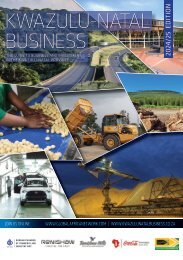South African Business 2018 edition
Welcome to the sixth edition of the South African Business journal. First published in 2011, the publication has established itself as the premier business and investment guide to South Africa, supported by an e-book edition at www.southafricanbusiness.co.za. Regular pages cover all the main economic sectors of the South African economy and give a snapshot of each of the country’s provincial economies. Feature articles on topical issues such as sustainability and African trade provide unique insights, together with an interview with the newly elected chairman of the African Association of Automotive Manufacturers, Mr Thomas Schaefer. Another special feature focusses on an exciting project to transform South Africa’s small harbours and coastal properties. South African Business is complemented by nine regional publications covering the business and investment environment in each of South Africa’s provinces. The e-book editions can be viewed online at www.globalafricanetwork.com. First published in 2011, the publication has established itself as the premier business and investment guide to South Africa, supported by an e-book edition at www.southafricanbusiness.co.za Regular pages cover all the main economic sectors of the South African economy and give a snapshot of each of the country’s provincial economies. Feature articles on topical issues such as sustainability and African trade provide unique insights, together with an interview with the newly elected chairman of the African Association of Automotive Manufacturers, Mr Thomas Schaefer. Another special feature focusses on an exciting project to transform South Africa’s small harbours and coastal properties. South African Business is complemented by nine regional publications covering the business and investment environment in each of South Africa’s provinces. Visit www.globalafricanetwork.com for more business and investment news, opportunities and events.
Welcome to the sixth edition of the South African Business journal. First published in 2011, the publication has established itself as the premier business and investment guide to South Africa, supported by an e-book edition at www.southafricanbusiness.co.za.
Regular pages cover all the main economic sectors of the South African economy and give a snapshot of each of the country’s provincial economies. Feature articles on topical issues such as sustainability and African trade provide unique insights, together with an interview with the newly elected chairman of the African Association of Automotive Manufacturers, Mr Thomas Schaefer. Another special feature focusses on an exciting project to transform South Africa’s small harbours and coastal properties.
South African Business is complemented by nine regional publications covering the business and investment environment in each of South Africa’s provinces. The e-book editions can be viewed online at www.globalafricanetwork.com.
First published in 2011, the publication has established itself as the premier business and investment guide to South Africa, supported by an e-book edition at www.southafricanbusiness.co.za
Regular pages cover all the main economic sectors of the South African economy and give a snapshot of each of the country’s provincial economies. Feature articles on topical issues such as sustainability and African trade provide unique insights, together with an interview with the newly elected chairman of the African Association of Automotive Manufacturers, Mr Thomas Schaefer. Another special feature focusses on an exciting project to transform South Africa’s small harbours and coastal properties.
South African Business is complemented by nine regional publications covering the business and investment environment in each of South Africa’s provinces. Visit www.globalafricanetwork.com for more business and investment news, opportunities and events.
Create successful ePaper yourself
Turn your PDF publications into a flip-book with our unique Google optimized e-Paper software.
OVERVIEW<br />
of about four-million tons, definitive<br />
proof that the long drought<br />
which hit <strong>South</strong> Africa is over, at<br />
least in the central and northern<br />
regions. The Western Cape<br />
drought continues.<br />
The Land Bank intends to put<br />
aside R1-billion in supporting<br />
black agricultural entrepreneurs.<br />
The hope is that by making the<br />
sector more inclusive, long-term<br />
food security will be ensured.<br />
Fruit, sugar and wine make up<br />
about 7% of the country’s total<br />
export basket. Avocadoes, tomatoes<br />
and macadamias are among<br />
other important export crops.<br />
More than 50% of agricultural<br />
export is made up of processed<br />
agricultural products, a promising<br />
development for the future of agriprocessing.<br />
National trade policy<br />
strategies are intended to enhance<br />
this trend. Primary agriculture<br />
provides 5% of formal employment<br />
in <strong>South</strong> Africa.<br />
Several of the Special Economic<br />
Zones around <strong>South</strong> Africa either<br />
have or will in the future have<br />
agri-processing facilities.<br />
Examples include existing tomato<br />
paste and dairy facilities at Coega<br />
IDZ and plans to develop the SEZ<br />
at Harrismith (Maluti-A-Phofung)<br />
into a hub for agri-processing.<br />
Several former farmers’ cooperatives<br />
are now substantial<br />
agri-businesses. Most have a<br />
specific geographic and farming<br />
sector focus (BKB is strong in the<br />
eastern Free State and Eastern<br />
Cape and concentrates on wool<br />
and mohair) while others like Afgri<br />
have a national presence.<br />
Senwes has a strong grain division<br />
and it controls 68 silos. Its operations<br />
are run from Klerksdorp in<br />
the centre of the country in North West Province. Other companies include<br />
NTKLA (Limpopo), GWK (Northern Cape), Klein Karoo Agri, VKB (eastern<br />
Free State and Limpopo), Kaap Agri (from the Boland to the Eastern Cape<br />
and up to Namibia), SSK (Overberg) and TWK (KZN and Mpumalanga).<br />
Crops<br />
A total of 70% of <strong>South</strong> Africa’s grain production is maize, which<br />
covers 60% of the cropping area of the country. The North West Province<br />
produces one third of <strong>South</strong> Africa’s maize and about 15% of its wheat.<br />
The Free State is the country’s largest supplier of wheat (37%) and maize<br />
(34%). The Western Cape has 350 000ha of wheat-producing land.<br />
Macadamia nuts is one of the fastest-growing sectors in <strong>South</strong> Africa.<br />
Almost all of nuts produced are exported and the global market is<br />
expanding every year: nearly 2 000ha are added to the land under<br />
macadamias every year. Mpumalanga and Limpopo provinces are big<br />
nut-growing provinces. Another sector enjoying a boom (mainly because<br />
of Chinese demand) is avocadoes, with almost 1 000ha per year<br />
of new land being planted.<br />
The <strong>South</strong> Africa feed industry has an annual turnover of about<br />
R50-billion with most of the raw material being soya and maize.<br />
Two of the country’s big three sugar producers (Illovo Sugar and<br />
Tongaat Hulett) each shut down one of their mills because of the extended<br />
drought and the broader trend for sugar production and the<br />
amount of land under sugar cane is downwards. The prospect of a<br />
sugar tax will not help sales. Both of these companies have diversified<br />
portfolios with Tongaat Hulett active in property in KwaZulu-Natal. The<br />
other big sugar company, TSB Sugar, has been acquired by RCL Foods.<br />
The Free State Province supplies significant proportions of the nation’s<br />
sorghum, sunflower, potatoes, groundnuts, dry beans, and almost all of its<br />
cherries. Barley and canola are produced in the Western Cape.<br />
Products distinctive to <strong>South</strong> Africa, such as rooibos tea (Western<br />
Cape) and marula berries (Limpopo) hold great potential to capture niche<br />
markets internationally.<br />
Fruit<br />
<strong>South</strong> Africa is famous for its fruit, of which 35% is citrus, 23% subtropical<br />
and nuts, 26% pome fruit, 11% stone fruit and 9% table grapes.<br />
Export volumes, particularly in tropical fruits such as mangoes and<br />
avocadoes, have been growing rapidly in recent years. The sector is<br />
highly sophisticated and is skilled at the refrigeration and packing<br />
required for European Union standards. With clarity now achieved on<br />
refrigeration protocols in China, <strong>South</strong> Africa intends increasing table<br />
grape exports to that country to R2.5-billion within five years.<br />
61 SOUTH AFRICAN BUSINESS <strong>2018</strong>


















